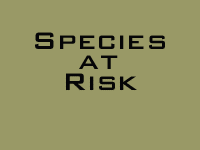
 |
 |
White Whale (Beluga)
Delphinapterus leucas
These highly social animals are also known as belugas, from a Russian word which means 'whitish'. These whales prefer the colder northern waters of Canada. They are often found in the St. Lawrence river where they may remain until the first sign of freeze over. White whales travel in gams of 100 individuals which are subdivided into groups of 2 or 3 whales. The largest specimen ever recorded was 5 metres in length, but white whale rarely reach that length in the wild. Their only natural predators are orcas and humans. The beluga has recently faced the possibility of disappearing from the St. Lawrence, having been greatly affected by pollution. Because they are near the top of the food chain, and because of their fat stores, belugas are subject to bioaccumulation. Lipophylic toxins do not leave the body once they have bonded to fat cells, and for a period, any dead beluga that was found along the banks of the St. Lawrence was treated as if it were hazardous waste due to the extreme level of contamination. White whales feed on pelagic fish such as char, cod, and haddock, as well as a wide variety of invertebrates.
